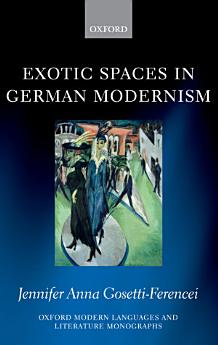Exotic Spaces in German Modernism
paź 2011 · OUP Oxford
E-book
288
Strony
family_home
Odpowiednia
info
reportOceny i opinie nie są weryfikowane. Więcej informacji
Informacje o e-booku
Jennifer Anna Gosetti-Ferencei demonstrates that the exotic, as reflected in major works of German literature and in the philosophy and art that inspires it, provokes central questions about the modern self and the spaces it inhabits. Exotic spaces in the writings of such authors as Thomas Mann, Franz Kafka, Stefan Zweig, Robert Musil, Hugo von Hofmannsthal, Gottfried Benn, and Bertold Brecht, along with the thought of Nietzsche, Freud, Levi-Strauss, and Simmel and the art of German Expressionism, are shown to present alternatives to the landscape and experience of modernity. In an examination of the concept of the exotic and of spatial experience in their cultural, subjective, and philosophical contingencies, Gosetti-Ferencei shows that exotic spaces may contest and reconfigure the relationship between the familiar and the foreign, the self and the other. Exotic spaces may serve not only to affirm the subject in a symbolic conquering of territory, as emphasized in post-colonial interpretations, or project the fantasy of escapism to a lost paradise, as utopian readings suggest, but condition moral, aesthetic, or imaginative transformation. Such transformation, while risking disaster or dissolution of the self as well as endangerment of the other, may promote new possibilities of perceiving or being, and reconfigure the boundaries of a familiar world. As exotic spaces are conceived as mystical, liberating, erotic, infectious, frightening or mysterious, several possibilities for transformation emerge in their exposure: re-enchantment through epiphany; the collapse of the rational self; liberation of the imagination from the confines of the familiar world; and aesthetic transformation, revealing the paradoxically 'primitive' nature of modern experience. In strikingly original readings of canonical authors and compelling rediscoveries of forgotten ones, this study establishes that exotic experience can evidence the fragility of the European or Germanic self as depicted in modernist literature, revealing the usually unconsidered boundaries of the subject's own familiar world.
O autorze
Jennifer Anna Gosetti-Ferencei is Professor of Philosophy, Director of Graduate Studies in Philosophy, and a member of the Literary Studies Faculty at Fordham University in New York City, where she teaches Continental Philosophy, Aesthetics, and the Philosophy of Literature. She completed graduate studies at Oxford University (DPhil, German Literature; MSt, European Literature); Columbia University (MFA, poetry); and Villanova University (PhD, MA, philosophy). Her previous books include Heidegger, Hölderlin, and the Subject of Poetic Language; The Ecstatic Quotidian: Phenomenological Sightings in Modern Art and Literature; and After the Palace Burns, which won The Paris Review Prize in poetry. She is also co-translator of Heidegger's Phenomenology of Religious Life.
Oceń tego e-booka
Podziel się z nami swoją opinią.
Informacje o czytaniu
Smartfony i tablety
Zainstaluj aplikację Książki Google Play na Androida i iPada/iPhone'a. Synchronizuje się ona automatycznie z kontem i pozwala na czytanie w dowolnym miejscu, w trybie online i offline.
Laptopy i komputery
Audiobooków kupionych w Google Play możesz słuchać w przeglądarce internetowej na komputerze.
Czytniki e-booków i inne urządzenia
Aby czytać na e-papierze, na czytnikach takich jak Kobo, musisz pobrać plik i przesłać go na swoje urządzenie. Aby przesłać pliki na obsługiwany czytnik, postępuj zgodnie ze szczegółowymi instrukcjami z Centrum pomocy.





